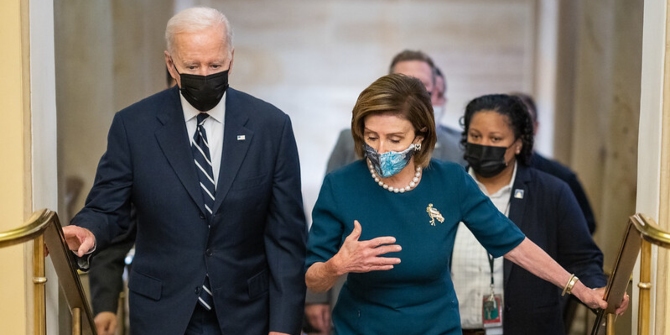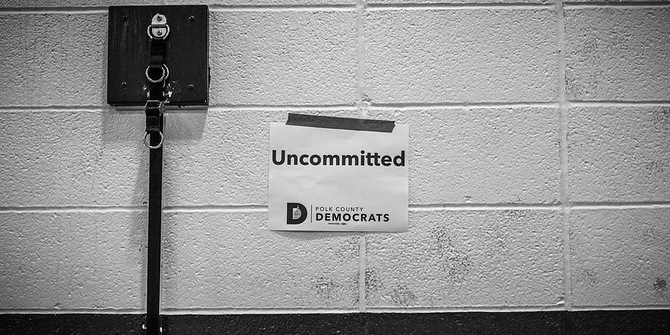 With the results of the two run-off elections in Georgia, the framework of Washington during the early stages of Joe Biden’s presidency have been set: with Democrats in charge of the White House, the House of Representatives, and (just about) the Senate. Peter Finn cautions that, though the Democrats may well achieve some significant policy goals, they should also expect discord, with Trumpism continuing to be a factor.
With the results of the two run-off elections in Georgia, the framework of Washington during the early stages of Joe Biden’s presidency have been set: with Democrats in charge of the White House, the House of Representatives, and (just about) the Senate. Peter Finn cautions that, though the Democrats may well achieve some significant policy goals, they should also expect discord, with Trumpism continuing to be a factor.
- Following the 2020 US General Election, our mini-series, ‘What Happened?’, explores aspects of elections at the presidential, Senate, House of Representative and state levels, and also reflects on what the election results will mean for US politics moving forward. If you are interested in contributing, please contact Rob Ledger (ledger@em.uni-frankfurt.de) or Peter Finn (finn@kingston.ac.uk).
Georgia on my Mind
Control of the US Senate, and with it the chance of unified control of the White House and both houses of Congress for Democrats, came down to two runoff elections held in Georgia on January 5th. These elections were held because no candidates were able to get more than 50 percent of the vote in either of the Senate races held in Georgia in November 2020. In one run-off Republican incumbent Kelly Loeffler, a Trump loyalist who was appointed to a Senate seat in 2019 by Georgia Governor Brian Kemp after her predecessor stood down for health reasons, ran against Raphael Warnock, a pastor of Ebenezer Baptist Church in Atlanta who was running for the Democrats. In the second run-off, Republican David Perdue, who was first elected as a US Senator for Georgia in 2015, ran against Democrat Jon Ossoff. Both races became nationalised, with both Biden and Trump campaigning, and hundreds of millions of dollars spent on advertising.
As was the case in the November General Election, early voting, both in-person and by mail, played an important role in the race, with 40 percent of registered voters having already cast their vote on the eve of the election. Warnock was called as the winner against Loeffler early on January 6th 2021, with Warnock having secured victory over Loeffler by almost 90,000 votes. Ossoff beat Perdue by a smaller margin.
With the addition of Vice-President Elect Kamala Harris, these victories have given Democrats unified control of the Federal Government by the slenderest of margins.
President Biden
Joe Biden won the largest popular vote mandate in US history, garnering more than 80 million votes. He won the Electoral College 306 to 232, with his slow burn victory declared on November 7th, half a week on from the election on November 3rd. In reality, though it took a few days to be confirmed, Biden’s victory was largely settled by the tens of millions who voted early in person and via mail in the weeks leading up to the election.
The challenges now faced by Biden are gargantuan. Most obviously they include dealing with coronavirus, re-engaging the US Federal Government on climate change, and addressing inequalities within US society. His administration now has a tenuous route through which such challenges can be approached.
Speaker Pelosi’s House
On January 3rd Democrat Nancy Pelosi was re-elected as Speaker of the House of Representatives. She was elected by 216 votes to 209 over Republican House Minority Leader Kevin McCarthy. Pelosi, who has been the leader of the Democrats in the chamber since 2003 and House Speaker for six of those years, said her caucus accepted ‘a responsibility as daunting and demanding as any that previous generations of leadership have faced’, claiming ‘[o]ur most urgent priority will continue to be defeating the coronavirus. And defeat it, we will.’

“2021.01.02 DC Street, Washington, DC USA 002 02201-Edit” by Ted Eytan is licensed under CC BY SA 2.0
Providing a snapshot of ongoing partisan tensions, meanwhile, McCarthy, whose party cut the Democrat majority in the chamber in the November elections by nine over the previous congress, said the smaller majority held by the Democrats this term was a ‘wake-up call’, and asked of the Democrats ‘were you listening?’
Trump and Trumpism
A continual background noise to the assembling of the Washington of the first half of Biden’s first term as president has been continual unsuccessful attempts by Trump and his associates and supporters to challenge the 2020 election result. Courts, including the US Supreme Court, have consistently dismissed legal challenges to Biden’s victory, with Pennsylvanian Judge Matthew Brann calling one lawsuit a ‘Frankenstein’s Monster’.
In a leaked taping of a January 2nd phone call Trump can be heard imploring Republican Secretary of State Brad Raffensperger of Georgia to commit fraud, or face legal consequences, in order to ‘find 11,780 votes’ needed to overturn Biden’s victory in the state. Trump told Raffensperger ‘there’s nothing wrong with saying, you know, that you’ve recalculated’, with Raffensperger telling Trump ‘Mr. President, the challenge that you have is, the data you have is wrong.’
Finally, Trump urged his supporters to disrupt proceedings with incendiary language while the US Congress was attempting to certify Biden’s victory on January 6th: an urging his supporters took up with violent gusto, storming the Capitol Building. Trump attacked his own Vice-President Mike Pence, who was overseeing the certification proceedings, Tweeting:
‘Mike Pence didn’t have the courage to do what should have been done to protect our Country and our Constitution, giving States a chance to certify a corrected set of facts, not the fraudulent or inaccurate ones which they were asked to previously certify. USA demands the truth!’
One presumes that for many Republicans Biden’s inauguration on January 20th (or sooner if Trump resigns, is removed via impeachment or the 25th Amendment), and a chance to work towards the 2022 midterms without Trump at the helm of the party, cannot come soon enough. Yet, the outgoing president still has significant power within the Republican Party and base and will likely continue to try to influence events from the side-lines, greasing his base by teasing a 2024 presidential run (though impeachment could lead to this possibility being precluded via Article 1 Section 3 if Congress decided to bar him from holding any future Federal office).
—
The next two years in US politics promise to be tumultuous (in reality more like a year and a half, as the fall of 2022 will be dominated by the lead up to midterms). The Democrats have unified control in Washington D.C. by the smallest of margins, whilst Trump appears poised to leverage his popularity to cause problems for Republicans and Democrats alike.
Biden has a narrow route to big policy achievements. Navigating this route will require the sustained application of political savvy, appeasing various wings of his own party and potentially working with some Republicans if he is unable to bring all Democrats with him.
Please read our comments policy before commenting.
Note: This article gives the views of the author, and not the position of USApp– American Politics and Policy, nor of the London School of Economics.
Shortened URL for this post: https://bit.ly/39yH6tQ
About the author
 Peter Finn – Kingston University
Peter Finn – Kingston University
Dr Peter Finn is a multi-award-winning Senior Lecturer in Politics at Kingston University. His research is focused on conceptualising the ways that the US and the UK attempt to embed impunity for violations of international law into their national security operations. He is also interested in US politics more generally, with a particular focus on presidential power and elections. He has, among other places, been featured in The Guardian, The Conversation, Open Democracy and Critical Military Studies.






